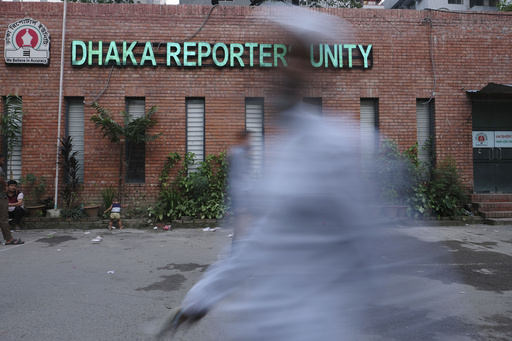
NEW DELHI — An association representing editors along with various rights organizations has decried the recent action taken by Bangladesh’s interim government, which has canceled press accreditations for 167 journalists. This decision is viewed as a significant threat to press freedom in the nation.
The Press Information Department executed the revocation of accreditations in three distinct phases from October 29 to November 7, sparking immense backlash from reporters and advocates for press rights.
This latest action has intensified existing worries regarding the safety and freedom of journalists, especially following the removal of former Prime Minister Sheikh Hasina in August during a student-led uprising. The Editors’ Council raised concerns that this move by the government, led by Nobel Peace Prize laureate Muhammad Yunus, could promote a climate of censorship and control over media outlets.
The notifications sent to journalists did not provide specific reasons for the accreditation revocation, only noting that the actions were taken in accordance with a policy enacted in 2022.
The Press Information Department was not immediately reachable for comments regarding the situation. The Editors’ Council emphasized that although it is within the government’s authority to review the use of accreditation, actions should not be taken without substantial evidence or allegations of misconduct.
Moreover, the organization stated that this decision contradicts the very essence of the revolution that ousted Hasina from power. This uprising arose from discontent over employment issues, escalating into a broader revolt against her increasingly authoritarian regime, which resulted in numerous fatalities. Following her ousting, Hasina fled the country.
The editors’ association criticized the interim government’s actions as a repetition of the “undemocratic practices” exemplified by Hasina’s administration, urging Yunus to safeguard press freedoms.
During her final year in power, Hasina’s government faced severe criticism for employing stringent measures and oppressive laws aimed at suppressing dissent and restricting press freedoms. By 2024, Bangladesh was rated 165th out of 180 countries in the World Press Freedom Index, marking its lowest ranking ever.
Although journalists can continue to report without accreditation, they are barred from entering government ministries, which hinders their ability to cover official press events effectively. Among those whose accreditations have been revoked is a journalist from a well-known news agency.
AP Executive Editor Julie Pace expressed strong condemnation against the actions of the Bangladeshi authorities, calling for an immediate reinstatement of the journalist’s credentials.
Media watchdog Reporters Without Borders commented that the revocation of accreditations fosters a culture of self-censorship and found the action particularly perplexing, coming just days after the Information Ministry formed a committee to track cases of journalist harassment.
Transparency International Bangladesh declared the cancellation of accreditation along with increasing threats against the press as a sign of an “anti-people authoritarian regime.” The interim government, which took over in August, had pledged to restore democracy and protect press freedom. In a recent discussion with the country’s leading newspaper, Yunus emphasized the importance of media freedom, encouraging journalists to write freely and criticize government actions.
Despite these assurances, the harassment and violence against journalists have continued unabated. Reporters Without Borders reported that at least 25 journalists, including some sympathetic to Hasina, are facing charges related to violence during protests.
In August, Human Rights Watch criticized the detainment of two journalists, highlighting concerns regarding the judicial system’s failure to uphold due process, suggesting it mirrored previous abuses and targeted specific individuals unfairly.
